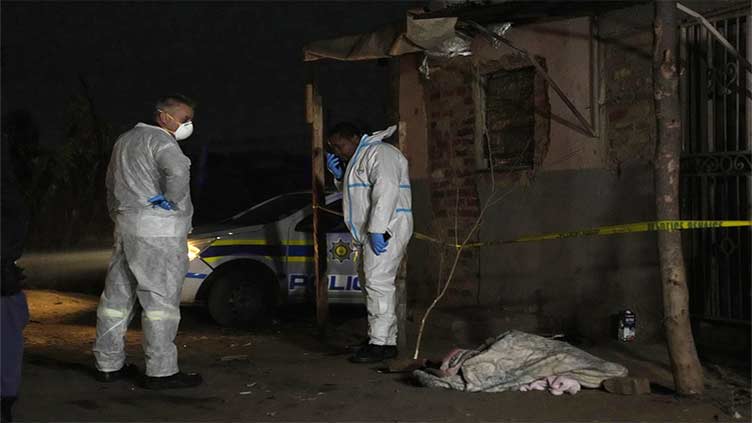Toxic gas leak in South Africa has killed 16 people, including 3 children, police say

World
Emergency services initially announced that as many as 24 people might be dead in Angelo settlement
JOHANNESBURG (AP) — At least 16 people, including three children, were killed by a leak of a toxic nitrate gas being used by illegal miners to process gold in a settlement of closely packed metal shacks, South African police and local officials said late Wednesday.
Emergency services initially announced that as many as 24 people might be dead in the Angelo settlement in Boksburg, a city on the eastern outskirts of Johannesburg. But police and Gauteng Province Premier Panyaza Lesufi later said the number of deaths had been confirmed as 16 after a recount of the bodies.
“It’s not a nice scene at all ... It’s painful, emotionally draining and tragic,” Lesufi, who visited the scene, was quoted as saying in news reports.
Teams were searching the area looking for other casualties deep into the night. The bodies of the victims remained lying on the ground hours after the leak was reported around 8 pm as emergency services waited for forensic investigators and pathologists to arrive to process the scene. The bodies were still there at 3 am.
“We can’t move anybody. The bodies are still where they are on the ground,” said emergency services spokesman William Ntladi.
A forensic investigator was seen covering the body of a small child with a blanket. Another body could be seen covered in a white cloth with a shoe sticking out. It lay under a strip of yellow police tape cordoning off the area.
Police said the three children killed were aged 1, 6 and 15. Two people were taken to the hospital for treatment, police said.
Boksburg is the city where 41 people died after a truck carrying liquefied petroleum gas got stuck under a bridge and exploded on Christmas Eve.
Ntladi said Wednesday’s deaths were caused by a nitrate gas that leaked from a gas cylinder being kept in a shack. He said the canister had emptied out in the leak and teams were able to begin going over an area stretching out 100 meters (100 yards) from the cylinder to check for more casualties.
Investigators were searching through narrow alleys between shacks, cast into darkness by the lack of streetlights — a common situation in the deeply impoverished informal settlements found in and around South Africa’s cities. Six police cars, an armored vehicle and one ambulance were parked at the entrance to the Angelo settlement.
Ntladi said the information authorities had indicated the cylinder that caused the leak was being used by illegal miners to separate gold from dirt and rock.
Lesufi, the Gauteng premier, tweeted videos of the dusty inside of a shack where at least four gas cylinders can be seen on metal stands. The video also shows what Lesufi said was the cylinder responsible for the leak lying on the floor next to the entrance of the shack.
Authorities didn’t say if the illegal miners they believed to be responsible for the gas leak were among the casualties.
Illegal mining is rife in the gold-rich areas around Johannesburg, where miners go into closed off and disused mines to search for any deposits left over.
Mining fatalities underground are also common and the South African government department responsible for mining announced recently that at least 31 illegal miners were believed to have died in a gas explosion in a disused mine in the city of Welkom in central South Africa. The cause was methane gas, the mining department said.
Wednesday’s tragedy was likely to stoke more anger at illegal miners, who are often migrants from neighboring countries, operate in organized gangs and are blamed for bringing crime into neighborhoods.
Violence against illegal miners erupted last year and raged for days in an area west of Johannesburg after a group of 80 men, some of whom were believed to be illegal miners, were charged with gang raping eight women who were working on a TV shoot at a disused mine.

